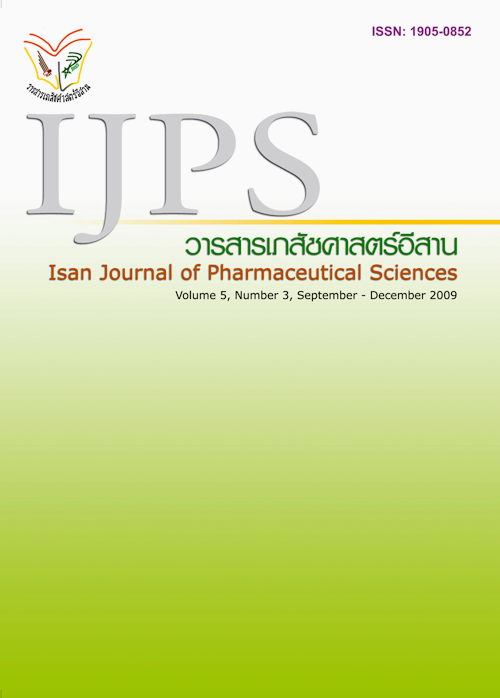Quality of Life of Cholangiocarcinoma Patients: Preliminary Study
Main Article Content
Abstract
This study was of longitudinal prospective design and sough to evaluate quality of life (QOL) of cholangiocarcinoma patients at before and one month after treatment. The incidence of adverse events and their impact on a patient’s QOL were also analyzed. The study population were new patients with cholangiocarcinoma receiving treatment at Khon Kaen or Srinagarind Hospitals. QOL was assessed using Thai Functional Assessment of Cancer Therapy-Hepatobiliary (FACT-Hep) version 4 and adverse events were assessed using Common Toxicity Criteria Adverse Event (CTCAE) version 3. The report of QOL was categorized as improved, no change and worsening based on clinical meaningful scores of the measures. The mean difference of QOL scores before and after treatment, the relation of adverse events, and their severity on QOL were analyzed using Wilcoxon Sign rank test, Mann-Whitney U test and Kruskal Wallis, respectively. Preliminary results from 16 cholangiocarcinoma patients indicate that. Most patients were male (69%), median age 59, able to work or do high activities at baseline (ECOG ≤ 1, 87%) and only 12 out of 16 patients received chemotherapy treatment (75%). After a one month period, 12 out of 16 patients reported no change or worsening QOL (75%). The most common adverse events reported were fatigue (69%), anorexia (69%), weight loss (44%) and nausea/vomiting (37%). There were more reports of grade 3 or 4 adverse events at one month after treatment in terms of fatigue (12.6% vs. 6.3%), anorexia (43.8% vs. 18.8%) and nausea/vomiting (12.5% vs. 6.3%) compared to baseline. Patients experiencing weight loss after the treatments had reported a statistically significant lower QOL than those without (p < 0.05). The alteration of fatigue severity from worsening, no-change or better after treatment has significantly affected QOL of these patients (p=0.05).
Article Details
In the case that some parts are used by others The author must Confirm that obtaining permission to use some of the original authors. And must attach evidence That the permission has been included
References
Andrykowski MA, Schmidit JE, Salsman JM, et al. Use of a case definition approach to identify cancer-related fatigue in women undergoing adjuvant therapy for breast cancer. J Clin Oncol2005 Sep 20; 23(27): 6613-6622.
Borneman T, Piper BF, Sun VCY, et al. Implementing the fatigue guidelines at one NCCN member institution: process and outcome. J Natl Compr Canc NetN 2007; 5(10): 1092-1101.
Bridgewater J, Imber C. New advances in the management of biliary tract cancer. HPB2007; 9: 104-111.
Cancer Treatment Centers of America. Mind-body medicine and emotional support [Online]. 2007[cited 2009]. Available from http://www.cancercenter.com/complementary-alternative-medicine/mind-body-medicine.cfm
Cella DF, Tulsky DS, Gray G, et al. The functional assessment of cancer therapy scale: development and validation of the general measure. J Clin Oncol 1993 Mar; 11(3):570-579.
Endo I, Gonen M, Yopp AC, et al. Intrahepaticcholangiocarcinoma rising frequency, improved survival, and determinants of outcome after resection. Ann Surg 2008; 248: 84-96.
Glimelius B, Hoffman K, Sjoden PO, et al. Chemotherapy improves survival and quality of life in advanced pancreatic and biliary cancer. Ann Oncol 1996; 7: 593-600.
Hann D.M., Garovoy N, Finkelstein B, et al. Fatigue and quality of life in breast cancer patients undergoing autologous stem cell transplantation a multidimensional perspective. Noninvasive approaches to pain management in the terminally ill. J Pain Symp 1999; 17(5): 311-319.
Hasegawa S, Ikai I, Fujii H, et al. Surgical resection of hilar cholangiocarcinoma: analysis of survival and postoperative complications. World J Surg 2007; 31: 1256-1263.
Iyer RV, Gibbs J, Kuvshinoff B, et al. A phase II study of gemcitabine and capecitabine in advancedcholangiocarcinoma and carcinoma of the gallbladder: A single-institution prospective study. Ann Surg Oncol 2007; 14(11):3202-3209.
Koeberle D, Saletti P, Borner M, et al. Patient-reported outcomes of patients with advanced biliary tract cancers receiving gemcitabine pluscapecitabine: a multicenter, phase II trial of the swiss group for clinical cancer research. J Clin Oncol 2008; 26(22): 3702-3708.
Miyazaki M, Takada T, Miyazawa S, et al. Risk factors for biliary tract and ampullarycarcinomas and prophylactic surgery for these factors. J Hepatobiliary Pancreat Surg 2008;15: 15-24.
Pratheepawanit N, Lerkiatbundit S, Thienthong S, et al. Validation of FACT-G (Thai version) in low literate patients. Patient Report Outcome2005; 34: 9-10.
Rao S, Cunningham D, Hawkins RE, et al. Phase IIIstudy of 5FU, etoposide and leucovorin (FELV)compared to epirubicin, cisplatin and 5FU(ECF) in previously untreated patients with advanced biliary cancer. BJC 2005; 92:1650-1654.
Ratanatharathorn V, Sirilerttrakul S, Jirajarus M, et al. Quality of life, functional assessment of cancer therapy-general. J Med Assoc Thai 2001;84(10): 1430-1442.
Steel JL, Eton DT, Cella D, et al. Clinically meaningful changes in health-related quality of life in patients diagnosed with hepatobiliary carcinoma. Ann Oncol 2006; 17: 304- 312.
Welzel TM, Graubard BI, EL-Serag HB, et al. Riskfactors for intrahepatic and extrahepaticcholangiocarcinoma in the United states: a population - based case - control study. Clin Gastroenterol Hepatol 2007; 5(10):1221-1228.


